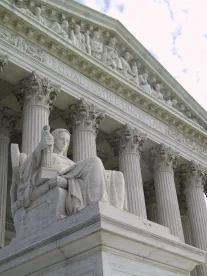On April 29, 2014, the United States Supreme Court issued two landmark decisions that could impact the ability of parties to obtain attorney’s fees in patent cases. Although some have viewed the cases as “anti-troll”, the changes in the law will apply to all patent cases, not just those involving “trolls.”
In Octane Fitness, LLC v. Icon Health & Fitness, Inc., the Court addressed whether the Federal Circuit’s framework for determining whether a case is “exceptional” under 35 U.S.C. § 285 is consistent with the statutory text of the Patent Act’s fee-shifting provision. Section 285 of the Patent Act authorizes a district court to award attorney fees to the prevailing party in patent litigation in “exceptional cases.” 35 U.S.C. § 285. In Brooks Furniture Mfg., Inc. v. Dutailier Int’l, Inc., 393 F.3d 1378, 1381, the Federal Circuit defined an “exceptional case” as one which either involves “material inappropriate conduct” or is both “objectively baseless” and “brought in subjective bad faith.” Brooks Furniture also requires a party to prove exceptionality by “clear and convincing evidence.” Id. at 1382.
The Supreme Court found that the Brooks Furniture framework is unduly rigid and impermissibly encumbers the statutory grant of discretion of district courts, contrary to the statutory text. First, the Supreme Court explained that an “exceptional” case is simply one that stands out from others with respect to the substantive strength of a party’s litigating position or the unreasonable manner in which the case was litigated—this is the new, more flexible standard that will be applied in future cases. Second, the Brooks Furniture framework superimposes an inflexible framework onto statutory text that is inherently flexible. More specifically, the Court found that Brooks Furniture is too restrictive in defining the two categories in which fee awards are allowed and so demanding that it would appear to render section 285 largely superfluous. The Court also concluded that section 285 imposes no specific evidentiary burden on the party seeking fees, overturning the Brooks Furniture requirement that proof of entitlement to fees be made by clear and convincing proof. The lower “preponderance of the evidence” standard now applies. With the burden of proof lowered and a more flexible standard in place, prevailing parties may find it easier to obtain attorney’s fees awards in the future.
On the same day, in Highmark Inc. v. Allcare Health Management System, Inc., the Supreme Court addressed whether a district court’s exceptional case finding under section 285 is entitled to deference. The Federal Circuit applied a de novo standard of review in the case on appeal, and in a closely-divided vote declined to address the standard of review issue en banc.
Following the logic of Octane, which emphasized the discretion of the district court when awarding or denying fees, the Supreme Court found that all aspects of the exceptional case determination should be reviewed for an abuse of discretion. The Court reasoned that the exceptional-case determination is based on statutory text that “emphasizes the fact that the determination is for the district court” and that court “is better positioned” to make that determination. Accordingly, the abuse of discretion standard will apply to all “exceptional case” issues in future appeals, making it more difficult to reverse district court decisions on this subject.




 />i
/>i

